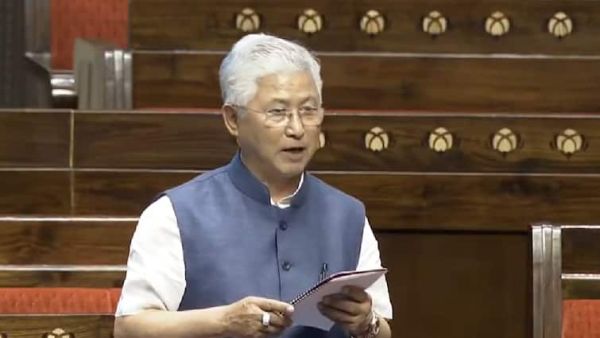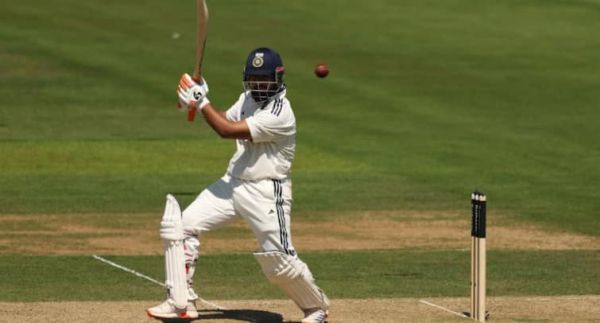
In a bold move stirring geopolitical debate, Rajya Sabha MP Dorjee Tshering Lepcha has renewed his call for India to officially refer to its boundary with Tibet as the Indo-Tibet border, instead of the currently used Indo-China border. The appeal, rooted in historical context and growing regional sentiment, was reiterated during his recent visit to Machong, a remote border village in Sikkim.
Speaking to reporters on Saturday, Lepcha said, “I raised this issue in Parliament during the Budget Session. This is the Tibet border, not the China border. The central government must direct agencies like the Army and the BRO to officially use the term ‘Indo-Tibet border’.”
His statement echoes a demand he has consistently pushed during parliamentary discussions, including during the 2024 Monsoon Session, where he urged central authorities to formally adopt the terminology.
#WATCH | Machong village, India-Tibet Border, Sikkim | BJP Rajya Sabha MP from Sikkim, Dorjee Tshering Lepcha, says, "... I raised an issue in the Parliament during the Budget Session that this is the Tibet border, not the China Border. The central government direct the central… pic.twitter.com/WeYLDyJ7Sh
— ANI (@ANI) July 12, 2025
Lepcha also cited recent remarks by Arunachal Pradesh Chief Minister Pema Khandu, who expressed a similar stance. “Just two days ago, the Arunachal CM also made a clear statement to a news outlet—that this is the Tibet border, not the China border,” Lepcha noted.
The remarks from both leaders come at a time when China’s territorial assertions over Tibet have reignited long-standing tensions. The geopolitical sensitivity around the region resurfaced prominently as Tibet’s spiritual leader, the 14th Dalai Lama, marked his 90th birthday on July 6.
In a powerful statement released ahead of the celebrations, the Dalai Lama reaffirmed that only his office holds the authority to determine his successor—directly challenging the Chinese Communist Party’s (CCP) repeated attempts to interfere in Tibetan religious traditions.
“As per historical tradition, the process of finding and naming the 15th Dalai Lama will be carried out by my office,” he declared, emphasizing that his reincarnation would be born outside of China.
In an old video from last year BJP MP put this topic in the Parliament, he urged the central govt to switch from "China border" to "Tibet border" for the 1,400 km stretch from Leh to Arunachal and Sikkim. He calls for official recognition by New Delhi, the Indian Army and BRO.
Sikkim MP Dorjee Tshering Lepcha urges the central govt to switch from "China border" to "Tibet border" for the 1,400 km stretch from Leh to Arunachal and Sikkim. He calls for official recognition by New Delhi, the Indian Army and BRO. #BorderPolicy #IndoTibetBorder #facts pic.twitter.com/KSQbV6zG1w
— Tibet Express བོད་ཀྱི་བང་ཆེན། (@Tibet_Express) July 31, 2024
This assertion was met with strong support from human rights groups. Tashi Tsering, secretary-general of the Human Rights Network for Tibet and Taiwan (HRNTT), hailed the Dalai Lama’s comments as “a powerful statement striking back at the CCP.” He condemned China’s “groundless claim” to select the next Dalai Lama, reiterating that such a decision lies solely with the Tibetan spiritual establishment.
As the debate intensifies, Lepcha’s demand brings a broader question to the forefront: Should India redefine its borders to reflect historical realities and political truths? And more importantly, what message would that send—not just to Beijing, but to the world?
-
England Strike Late; India 58/4 At Stumps, Need 135 Runs To Win Lord’s Test

-
Malaika Arora’s Florence Diaries: From Soulful Streets To Stylish Selfies With Son Arhaan

-
Jackie Shroff Joins ‘Tu Meri Main Tera’ Cast With Kartik Aaryan, Ananya Panday

-
Kareena Kapoor caught in chaos after attack on Saif Ali Khan

-
Moringa powder is a treasure of health, know its tremendous benefits and correct ways of intake
